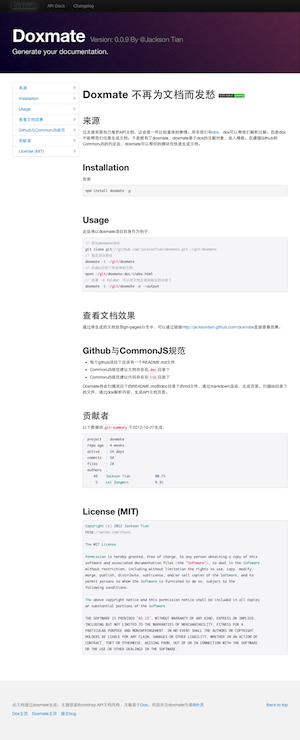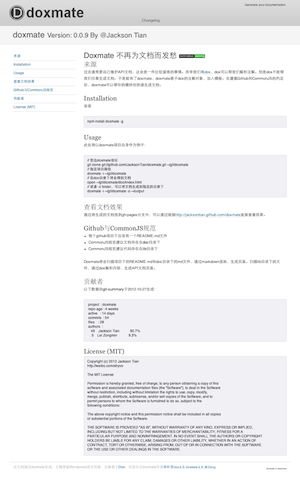javaScript documentation generator for node using markdown and jsdoc.

Dox is a JavaScript documentation generator written with node. Dox no longer generates an opinionated structure or style for your docs, it simply gives you a JSON representation, allowing you to use markdown and JSDoc-style tags.
output:
This output can then be passed to a template for rendering. Look below at the "Properties" section for details.
yields:
Large descriptions might look something like the following, where the
"summary" is still the first paragraph, the remaining description
becomes the "body". Keep in mind this is markdown, so you can indent code, use lists, links, etc. Dox also augments markdown, allowing "Some Title:\n" to form a header.
yields:
yields:
Additionally you can use
yields:
yields:
yields:
yields:
This array is exposed to allow for extension of unsupported context patterns by adding more functions. Each function is passed the code following the comment block and (if detected) the parent context if the block.
from https://github.com/tj/dox
--------------------------------
文档伴侣 http://html5ify.com/doxmate
Doxmate 不再为文档而发愁
目前提供三种模板


from https://github.com/JacksonTian/doxmate
Dox is a JavaScript documentation generator written with node. Dox no longer generates an opinionated structure or style for your docs, it simply gives you a JSON representation, allowing you to use markdown and JSDoc-style tags.
Installation
Install from npm:$ npm install -g dox
Usage Examples
dox(1) operates over stdio:$ dox < utils.js
...JSON...
--debug flag, which is easier to read than the JSON output: $ dox --debug < utils.js
/**
* Escape the given `html`.
*
* @example
* utils.escape('<script></script>')
* // => '<script></script>'
*
* @param {String} html string to be escaped
* @return {String} escaped html
* @api public
*/
exports.escape = function(html){
return String(html)
.replace(/&(?!\w+;)/g, '&')
.replace(/</g, '<')
.replace(/>/g, '>');
};
[
{
"tags": [
{
"type": "example",
"string": " utils.escape('<script></script>')\n // => '<script></script>'",
"html": "<pre><code>utils.escape('<script></script>')\n// => '&lt;script&gt;&lt;/script&gt;'\n</code></pre>"
},
{
"type": "param",
"string": "{String} html string to be escaped",
"types": [
"String"
],
"name": "html",
"description": "string to be escaped"
},
{
"type": "return",
"string": "{String} escaped html",
"types": [
"String"
],
"description": "escaped html"
},
{
"type": "api",
"string": "public",
"visibility": "public"
}
],
"description": {
"full": "<p>Escape the given <code>html</code>.</p>",
"summary": "<p>Escape the given <code>html</code>.</p>",
"body": ""
},
"isPrivate": false,
"ignore": false,
"code": "exports.escape = function(html){\n return String(html)\n .replace(/&(?!\\w+;)/g, '&')\n .replace(/</g, '<')\n .replace(/>/g, '>');\n};",
"ctx": {
"type": "method",
"receiver": "exports",
"name": "escape",
"string": "exports.escape()"
}
}
]
Usage
Usage: dox [options]
Options:
-h, --help output usage information
-V, --version output the version number
-r, --raw output "raw" comments, leaving the markdown intact
-a, --api output markdown readme documentation
-s, --skipPrefixes [prefixes] skip comments prefixed with these prefixes, separated by commas
-d, --debug output parsed comments for debugging
-S, --skipSingleStar set to false to ignore `/* ... */` comments
Examples:
# stdin
$ dox > myfile.json
# operates over stdio
$ dox < myfile.js > myfile.json
Programmatic Usage
var dox = require('dox'),
code = "...";
var obj = dox.parseComments(code);
// [{ tags:[ ... ], description, ... }, { ... }, ...]
Properties
A "comment" is comprised of the following detailed properties:- tags
- description
- isPrivate
- isEvent
- isConstructor
- line
- ignore
- code
- ctx
Description
A dox description is comprised of three parts, the "full" description, the "summary", and the "body". The following example has only a "summary", as it consists of a single paragraph only, therefore the "full" property has only this value as well./**
* Output the given `str` to _stdout_.
*/
exports.write = function(str) {
process.stdout.write(str);
};
description:
{ full: '<p>Output the given <code>str</code> to <em>stdout</em>.</p>',
summary: '<p>Output the given <code>str</code> to <em>stdout</em>.</p>',
body: '' },
/**
* Output the given `str` to _stdout_
* or the stream specified by `options`.
*
* Options:
*
* - `stream` defaulting to _stdout_
*
* Examples:
*
* mymodule.write('foo')
* mymodule.write('foo', { stream: process.stderr })
*
*/
exports.write = function(str, options) {
options = options || {};
(options.stream || process.stdout).write(str);
};
description:
{ full: '<p>Output the given <code>str</code> to <em>stdout</em><br />or the stream specified by <code>options</code>.</p>\n\n<h2>Options</h2>\n\n<ul>\n<li><code>stream</code> defaulting to <em>stdout</em></li>\n</ul>\n\n<h2>Examples</h2>\n\n<pre><code>mymodule.write(\'foo\')\nmymodule.write(\'foo\', { stream: process.stderr })\n</code></pre>',
summary: '<p>Output the given <code>str</code> to <em>stdout</em><br />or the stream specified by <code>options</code>.</p>',
body: '<h2>Options</h2>\n\n<ul>\n<li><code>stream</code> defaulting to <em>stdout</em></li>\n</ul>\n\n<h2>Examples</h2>\n\n<pre><code>mymodule.write(\'foo\')\nmymodule.write(\'foo\', { stream: process.stderr })\n</code></pre>' }
Tags
Dox also supports JSdoc-style tags. Currently only @api is special-cased, providing thecomment.isPrivate boolean so you may omit "private" utilities etc./**
* Output the given `str` to _stdout_
* or the stream specified by `options`.
*
* @param {String} str
* @param {{stream: Writable}} options
* @return {Object} exports for chaining
*/
exports.write = function(str, options) {
options = options || {};
(options.stream || process.stdout).write(str);
return this;
};
tags:
[ { type: 'param',
string: '{String} str',
types: [ 'String' ],
name: 'str',
description: '' },
{ type: 'param',
string: '{{stream: Writable}} options',
types: [ { stream: ['Writable'] } ],
name: 'options',
description: '' },
{ type: 'return',
string: '{Object} exports for chaining',
types: [ 'Object' ],
description: 'exports for chaining' },
{ type: 'api',
visibility: 'public' } ]
Complex jsdoc tags
dox supports all jsdoc type strings specified in the jsdoc documentation. You can specify complex object types including optional flag=, nullable ?, non-nullable ! and variable arguments ....Additionally you can use
typesDescription which contains formatted HTML for displaying complex types./**
* Generates a person information string based on input.
*
* @param {string | {name: string, age: number | date}} name Name or person object
* @param {{separator: string} =} options An options object
* @return {string} The constructed information string
*/
exports.generatePersonInfo = function(name, options) {
var str = '';
var separator = options && options.separator ? options.separator : ' ';
if(typeof name === 'object') {
str = [name.name, '(', name.age, ')'].join(separator);
} else {
str = name;
}
};
tags:
[
{
"tags": [
{
"type": "param",
"string": "{string | {name: string, age: number | date}} name Name or person object",
"name": "name",
"description": "Name or person object",
"types": [
"string",
{
"name": [
"string"
],
"age": [
"number",
"date"
]
}
],
"typesDescription": "<code>string</code>|{ name: <code>string</code>, age: <code>number</code>|<code>date</code> }",
"optional": false,
"nullable": false,
"nonNullable": false,
"variable": false
},
{
"type": "param",
"string": "{{separator: string} =} options An options object",
"name": "options",
"description": "An options object",
"types": [
{
"separator": [
"string"
]
}
],
"typesDescription": "{ separator: <code>string</code> }|<code>undefined</code>",
"optional": true,
"nullable": false,
"nonNullable": false,
"variable": false
},
{
"type": "return",
"string": "{string} The constructed information string",
"types": [
"string"
],
"typesDescription": "<code>string</code>",
"optional": false,
"nullable": false,
"nonNullable": false,
"variable": false,
"description": "The constructed information string"
}
]
Code
The.code property is the code following the comment block, in our previous examples:exports.write = function(str, options) {
options = options || {};
(options.stream || process.stdout).write(str);
return this;
};
Ctx
The.ctx object indicates the context of the code block, is it a method, a function, a variable etc. Below are some examples:exports.write = function(str, options) {
};
ctx:
{ type: 'method',
receiver: 'exports',
name: 'write',
string: 'exports.write()' } }
var foo = 'bar';
ctx:
{ type: 'declaration',
name: 'foo',
value: '\'bar\'',
string: 'foo' }
function User() {
}
ctx:
{ type: 'function',
name: 'User',
string: 'User()' } }
Extending Context Matching
Context matching in dox is done by performing pattern matching against the code following a comment block.dox.contextPatternMatchers is an array of all pattern matching functions,
which dox will iterate over until one of them returns a result. If none return a result,
then the comment block does not receive a ctx value.This array is exposed to allow for extension of unsupported context patterns by adding more functions. Each function is passed the code following the comment block and (if detected) the parent context if the block.
dox.contextPatternMatchers.push(function (str, parentContext) {
// return a context object if found
// return false otherwise
});
Ignore
Comments and their associated bodies of code may be flagged with "!" to be considered worth ignoring, these are typically things like file comments containing copyright etc, however you of course can output them in your templates if you want./**
* Not ignored.
*/
/*!
* Ignored.
*/
-S, --skipSingleStar or {skipSingleStar: true} to ignore /* ... */ comments.Running tests
Install dev dependencies and executemake test: $ npm install -d
$ make test
from https://github.com/tj/dox
--------------------------------
文档伴侣 http://html5ify.com/doxmate
Doxmate 不再为文档而发愁 
来源
过去通常要自己维护API文档,这会是一件比较蛋疼的事情。所幸我们有dox,dox可以帮我们解析注解。但是dox不能帮我们任意生成文档。于是就有了doxmate,doxmate基于dox的注解对象,加入模板。在遵循Github和CommonJS的约定后,doxmate可以帮你的模块包快速生成文档。Installation
安装doxmate为全局工具:$ npm install doxmate -g
Usage
此处将以doxmate项目自身作为例子:// 签出doxmate项目
$ git clone git://github.com/JacksonTian/doxmate.git ~/git/doxmate
// 去到项目目录
$ cd doxmate
$ doxmate build
// 在docs目录下将会得到文档
$ open ~/git/doxmate/doc/index.html
// 或者 -o folder,可以将文档生成到指定的目录下
$ doxmate build -o ~/output
选择模版
// 带上-s参数后,可以选择doxmate提供的几种模板
$ doxmate build -s wordpress
自定义模版
如果doxmate提供的几个模板不能满足你的需求// 查看doxmate目前已有的模板
$ doxmate theme list
// 在当前项目目录导出主题模板
$ doxmate theme export
// 将会在当前目录下生成{doxmate-templates/主题名}的目录
// 带上-s参数后,可以选择doxmate提供的几种模板
$ doxmate theme export -s pomelo
// 通过doxmate build创建文档的时,优先读取该目录
// 导出主题模板后,自行修改,即可实现自定义模板的目的
查看文档效果
通过将生成的文档放到gh-pages分支中,可以通过链接http://jacksontian.github.com/doxmate直接查看效果。目前提供三种模板
默认风格

wordpress风格

pomelo风格
Github与CommonJS规范
- 每个github项目下应该有一个README.md文件
- CommonJS规范建议文档存在在
doc目录下 - CommonJS规范建议代码存在在
lib目录下
from https://github.com/JacksonTian/doxmate

No comments:
Post a Comment